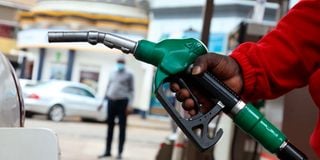Premium
Compensation or subsidy? Setting the record straight

A fuel attendant holding a fuel pump at the filling station along Kimathi Street, Nairobi.
President William Ruto has said the government was not reintroducing fuel subsidies.
“Let me tell the country that we will not go back to subsidies of any nature that distort things and cause us a lot of unnecessary leakage,” President Ruto said on August 16, 2023, during his address at the ongoing devolution conference in Eldoret.
He was responding to a story by the Nation in which we reported the latest development on fuel pricing.
The Nation Media Group stands by its story titled It’s compensation, not subsidy, state says on fuel priceswhich appeared in the Daily Nation of August 16th.
The story began by capturing the position of the government that the intervention undertaken in the August 14th fuel price review is a ‘compensation’ and not ‘subsidy’ with oil market firms earmarked to receive Sh7.33 per litre of Super Petrol, Sh3.59 per litre of Diesel and Sh5.74 per litre of Kerosene.
The Nation Media Group reached out to the Energy and Petroleum Regulatory Authority (EPRA) Director General, Daniel Kiptoo, with four questions one which was “At what point, in the programme that was retired in the May 14th, 2023 pump price review, did the country switch from a ‘stabilization’ to a ‘subsidy’?”.
The Director General’s response to this question was “The stipulation outlined in the Petroleum Development Order of 2020 pertains to the stabilization of petroleum pump prices. This provision was implemented in the release that occurred yesterday”.
This question from the Nation was informed by the fact that it was in the September 14th, 2022 fuel price review, the first under the Kenya Kwanza administration, that EPRA introduced the word ‘subsidy’ into its monthly release.
“Taking into account the weighted average cost of imported refined petroleum products and in line with government policy to progressively remove subsidyon petroleum fuels, the changes in the maximum allowed petroleum pump prices in Nairobi are as follows: Super Petrol, Diesel and Kerosene increase by Sh20.18, Sh25.0 and Sh20.0 per litre, respectively”, EPRA said in its September 14th,2022 release.
The market regulator went further to give reason for removal of what it termed as ‘subsidy’ in the price of Super Petrol while retaining the same for Diesel and Kerosene with a view to cushion Kenyans from high pump prices.
“Although the subsidy for super petrol has been removed, a subsidy of Sh20.82/litre and Sh26.25/litre has been retained for Diesel and Kerosene, respectively, in order to cushion consumers from the otherwise high prices”, EPRA said in its September 14th, 2022 release.
EPRA then provided a table capturing where the subsidy changes were taking place with the column on the extreme right indicating the same was tapped from proceeds realized through the Petroleum Development Levy.
It is worth noting that in the preceding month’s pump price review release, the Authority captured Sh54.91 per litre of Super Petrol, Sh66.17 per litre of Diesel and sh74.17 per litre of Kerosene as price differences to be compensated through the Petroleum Development Fund yet never used the word ‘subsidy’ to describe the same.





